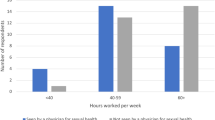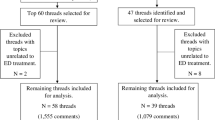Abstract
Misinformation is a rising concern for providers and patients alike. We aimed to assess where patients acquire information prior to their andrological urologic appointment and assess patients’ perception regarding the reliability of this information. A cross-sectional study was conducted at an outpatient men’s health clinic between June and August of 2022 with questionnaires distributed to adult males seen for their primary visit. The study included 314 consenting adult patients who independently completed the questionnaire (mean age: 51.2 ± 17.2). Overall, 55.1% of patients indicated they searched for their condition online. However, 39.2% and 27.7% of respondents agreed and strongly agreed, respectively, that misinformation is a concern when searching for health information. Only 59.9% of patients discussed their concerns with others and those that did not chose not wanting to (65.1%) as their top choice. However, 27.4% of respondents were embarrassed to do so. Finally, 38.2% and 12.4% of patients agreed and strongly agreed, that learning information prior to your appointment affects their relationship with the physician. These findings emphasize the need for urologists to be aware of where their patients are gathering health information and to address concerns regarding misinformation.
This is a preview of subscription content, access via your institution
Access options
Subscribe to this journal
Receive 8 print issues and online access
$259.00 per year
only $32.38 per issue
Buy this article
- Purchase on Springer Link
- Instant access to full article PDF
Prices may be subject to local taxes which are calculated during checkout

Similar content being viewed by others
Data availability
Data obtained is available from the authors upon reasonable request and with permission of the authors.
References
Patrick M, Venkatesh RD, Stukus DR. Social media and its impact on health care. Ann Allergy, Asthma Immunol. 2022;128:139–45. https://doi.org/10.1016/J.ANAI.2021.09.014.
Suarez-Lledo V, Alvarez-Galvez J. Prevalence of health misinformation on social media: systematic review. J Med Internet Res. 2021;23:e17187. https://www.jmir.org/2021/1/e17187.10.2196/17187.
Chou WYS, Oh A, Klein WMP. Addressing health-related misinformation on social media. JAMA. 2018;320:2417–8. https://doi.org/10.1001/JAMA.2018.16865.
Munich Security Conference. Accessed August, 2023. https://www.who.int/director-general/speeches/detail/munich-security-conference.
Krishna A, Thompson TL. Misinformation about health: a review of health communication and misinformation scholarship. Am Behav Scientist. 2021;65:316–32. https://doi.org/10.1177/0002764219878223/FORMAT/EPUB.
Tam J, Porter EK, Lee UJ. Examination of information and misinformation about urinary tract infections on TikTok and YouTube. Urology. 2022;168:35–40. https://doi.org/10.1016/J.UROLOGY.2022.06.030.
Schloegl I, Köhn FM, Dinkel A, Schulwitz H, Gschwend JE, Bosinski HAG, et al. Education in sexual medicine – a nationwide study among German urologists/andrologists and urology residents. Andrologia. 2017;49:e12611. https://doi.org/10.1111/AND.12611.
Jia X, Pang Y, Liu LS. Online health information seeking behavior: a systematic review. Healthcare. 2021;9. https://doi.org/10.3390/HEALTHCARE9121740.
Daraz L, Morrow AS, Ponce OJ, Beuschel B, Farah MH, Katabi A, et al. Can patients trust online health information? A meta-narrative systematic review addressing the quality of health information on the internet. J Gen Intern Med. 2019;34:1884–91. https://doi.org/10.1007/S11606-019-05109-0.
Tonsaker T, Gillian M, Trpkov C. Health information on the Internet Gold mine or minefield? Can Fam Physician. 2014;60:407–8.
Verma G, Bhardwaj A, Aledavood T, De Choudhury M, Kumar S. Examining the impact of sharing COVID-19 misinformation online on mental health. Sci Rep. 2022;12:1–9. https://doi.org/10.1038/s41598-022-11488-y.
Dubin JM, Aguiar JA, Lin JS, Greenberg DR, Keeter MK, Fantus RJ, et al. The broad reach and inaccuracy of men’s health information on social media: analysis of TikTok and Instagram. Int J Impot Res. Published online 2022:1. https://doi.org/10.1038/S41443-022-00645-6.
Beauvais C. Fake news: why do we believe it? Jt Bone Spine. 2022;89:105371. https://doi.org/10.1016/J.JBSPIN.2022.105371.
Baldwin K, Ginsberg P, Harkaway RC. Under-reporting of erectile dysfunction among men with unrelated urologic conditions. Int J Impot Res. 2003;15:87–89. https://doi.org/10.1038/SJ.IJIR.3900948.
Sunkara J. Sexual health misinformation and potential interventions among youth on social media. 2021;1:16. https://doi.org/10.18297/tce/vol1/iss1/16.
Xu AJ, Taylor J, Gao T, Mihalcea R, Perez-Rosas V, Loeb S. TikTok and prostate cancer: misinformation and quality of information using validated questionnaires. BJU Int. 2021;128:435–7. https://doi.org/10.1111/BJU.15403.
García-Cano-fernández AM, Szczesniewski-Dudzik JJ, García-Tello A, Diego-García V, Boronat-Catalá J, Llanes-González L. Quality of bladder cancer information on YouTube. Cent Eur J Urol. 2022;75:248–51. https://doi.org/10.5173/CEJU.2022.151.
Toprak T, Yilmaz M, Ramazanoglu MA, Verit A, Schlager D, Miernik A. YouTube is inadequate as an information source on delayed ejaculation. Int J Impot Res. 2023;35:392–7. https://doi.org/10.1038/S41443-022-00559-3.
Di Bello F, Ruvolo CC, Cilio S, Rocca RL, Capece M, Creta M, et al. Testicular cancer and YouTube: what do you expect from a social media platform? Int J Urol. 2022;29:685–91. https://doi.org/10.1111/IJU.14871.
Bernstein A, Zhu M, Loloi J, Babar M, Winokur N, Wysocki M, et al. TikTok as a source of information regarding premature ejaculation: a qualitative assessment. Sex Med. 2023;11:1–5. https://doi.org/10.1093/SEXMED/QFAC020.
WellPrept | Let’s fix clinic day. Accessed August, 2023. https://wellprept.com/.
Kingsberg SA. Taking a sexual history. Obstet Gynecol Clin North Am. 2006;33:535–47. https://doi.org/10.1016/J.OGC.2006.09.002.
Funding
This work was supported by the SMSNA Scholars in Sexuality Research Grant.
Author information
Authors and Affiliations
Contributions
KP was responsible for conception and design, acquisition, analysis, interpretation of data, drafting, revising, and final approval of the work. DSB was responsible for acquisition, analysis, interpretation of data, drafting, revising, and final approval of the work. MGVI was responsible for analysis, interpretation of data, drafting, revising, and final approval of the work. PP was responsible for conception and design, acquisition, analysis, interpretation of data, drafting, revising, and final approval of the work. All authors agree to be accountable for all aspects of the work in ensuring that questions related to the accuracy or integrity of any part of the work are appropriately investigated and resolved.
Corresponding author
Ethics declarations
Competing interests
PP is a consultant for Boston Scientific. The remaining authors declare no competing interests.
Ethical approval
Approval for this study was obtained from the University of Manitoba’s Health and Research Ethics Board (HS25526).
Additional information
Publisher’s note Springer Nature remains neutral with regard to jurisdictional claims in published maps and institutional affiliations.
Supplementary information
Rights and permissions
Springer Nature or its licensor (e.g. a society or other partner) holds exclusive rights to this article under a publishing agreement with the author(s) or other rightsholder(s); author self-archiving of the accepted manuscript version of this article is solely governed by the terms of such publishing agreement and applicable law.
About this article
Cite this article
Bal, D.S., Panchendrabose, K., Van Iderstine, M.G. et al. The impact of misinformation on patient perceptions at a men’s health clinic: a cross-sectional study. Int J Impot Res (2023). https://doi.org/10.1038/s41443-023-00790-6
Received:
Revised:
Accepted:
Published:
DOI: https://doi.org/10.1038/s41443-023-00790-6



